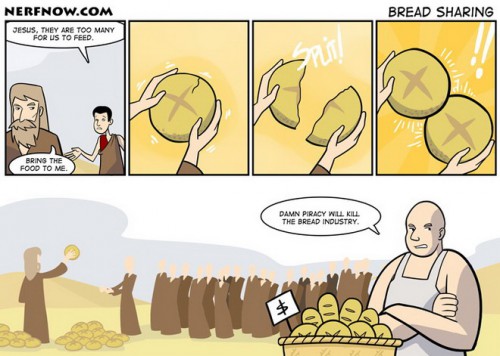Translated to English by Donatas Pocius.
I am not trying to ask how much somebody could pay to a certain Minister of Agriculture of one or another EU country, who participated in some sort of secret European Union circles which created the ACTA for us, because everybody knows that the ministers do not take bribes. I just want to write about how ACTA is directed not only against pirates, but also against everyone. And how everybody will suffer harm from it – pensioners, schoolchildren, students, mothers posting on internet boards, farmers, and everyone else. Everyone without exceptions. Apart from a few interested groups, of course.
It is clear that there was no inevitability in signing ACTA. It is also clear that it was done like that not without a reason. The interesting thing here is that the Lithuanian Ministry of Agriculture, led by Kazimieras Starkevičius, did not put document any at least resembling ACTA on its website, although it participated in its preparation. At least I could not find anything about it. One way or another, it is obvious that when Ministry of Agriculture prepares the agreements on trademark protection, piracy etc., it looks similar as if the provision of heating in Vilnius would be regulated by some sort of fish breeding inspection, which would ground its decisions on data from telescopes.
Maybe that is why it is entirely unsurprising that this ACTA agreement, organised by Ministry of Foreign Affairs and Ministry of Agriculture, is starting to generate protests even in Lithuania, an exceptionally passive and protest averse country. Even here the demonstrations are proposed. This is because everybody knows that under the cover of ACTA, the new limitations, new laws etc. will be created, with excuses that under ACTA Lithuania has an obligation to do this and that.

Not so long ago this picture looked like a joke. Now it starting to get clear this is not a joke. Anti-pirates have aimed at independent manufacturers and producers, small businesses, farmers and all the people in general.
What delirious nonsense is done by some law enforcers even without ACTA is well illustrated by a British example, where the court punished a photographer for making a photo of a bus allegedly leading to the theft of intellectual property. So there is hardly any doubt for anyone what is going to become of ACTA when it is signed.
On the other hand, the secrecy of ACTA’s preparation is not surprising: there were no talks, there was nothing at all. Only with one day remaining before the signing of the agreement, when the entire world was already screaming about ACTA, some representative of Lithuanian Ministry of Foreign Affairs said it will be signed because somewhere some ministers of agriculture decided so. As if it was inevitable. That leads to an interesting question – what is the minister of sorts Audronius Ažubalis doing, if all the announcements about this agreement on MFA’s website are made post factum – about the signing which has already been made?
By the way, it is interesting to remember the experience of other countries here. For example, thanks to Wikileaks, very interesting information has become available about the strengthening of anti-piracy measures in Sweden and the reasons for this. After reading what is going on there, there is no doubt that those fights against alleged pirates are just a one-sided game in which the European countries (including Lithuania) are losing and in which the money is taken by a few American companies actively lobbying both in the USA and in other countries all over the world.
Therefore, as nobody has asked this yet, I am asking: mister Starkevičius, when are you going to resign? And you, mister Ažubalis, when are you going to resign?
However, there are some other quite interesting aspects of this ACTA agreement, even if one tries to forget all the evil it hides. For instance, it is very interesting to analyse who is interested to push it through. I would distinguish four key groups of major pushers of these agreements. And these groups are not as obvious as it looks from the first sight. So, let us take a look what sorts of interests are hiding there.


